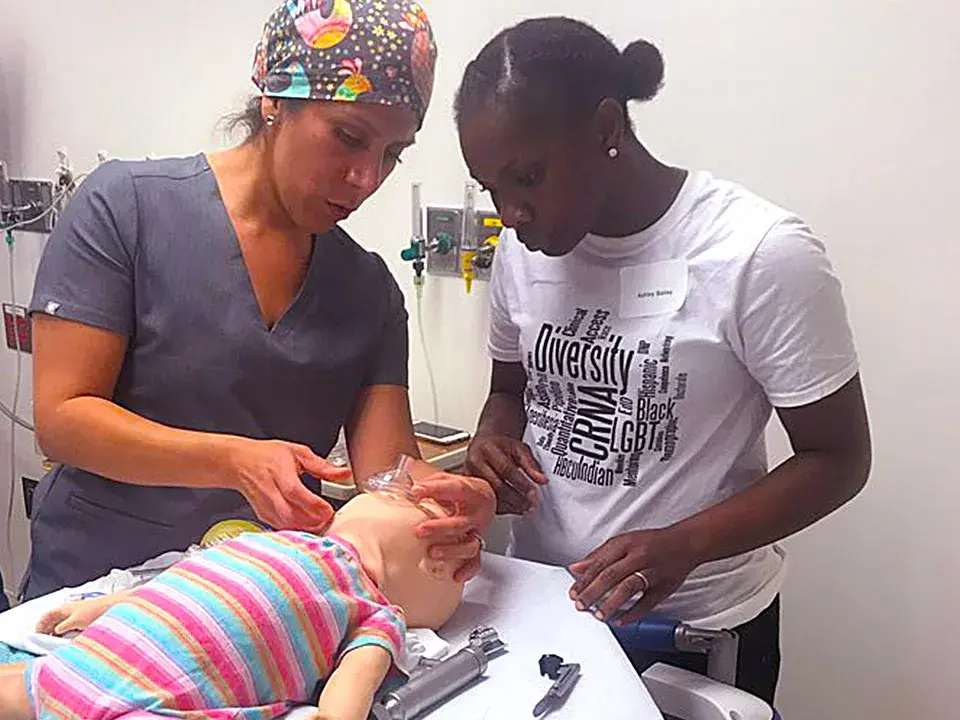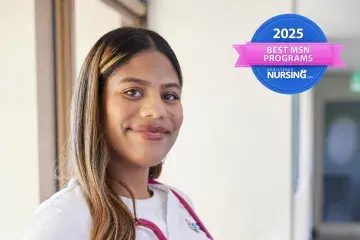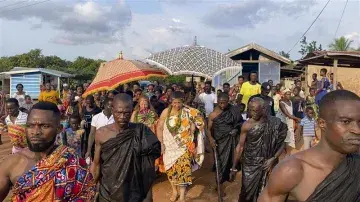Ana Armenta, CRNA ’16, Grew Up in Poverty. Now She’s a Nurse with a Master’s Degree

In the second of three Q&As with SMU alumnae who received the 2021 Create & Cultivate (C&C) 100 Award, Ana Armenta, CRNA ’16, discusses her journey from Honduras to Louisiana to California and how she overcame obstacles, some that would stop many of us in our tracks, to achieve her dreams.
C&C is a Los Angeles-based digital publisher and conference host that celebrates and promotes women in business. This year, C&C honored female hospital workers, comprising 77% of workers in the field, for their efforts to fight the pandemic. (Read the first in the series with Jennifer Katsura, CRNA ’18.)
What was it like working during the worst part of COVID?
It was stressful to say the least. I counted on my education and training to get me through each day during the pandemic. Being a nurse anesthetist is a stressful job to begin with, but being a nurse anesthetist during the pandemic was extraordinarily difficult.
We are considered the “airway experts,” so we had no choice but to continue to do our jobs regardless of the pandemic. There was just an added element of donning/doffing PPE before intubating our patients. We learned how to manage the stressors to get through the day in order to take care of our patients. We had to make sure that everyone stayed safe and COVID-free.
So, for the most part, I can say that it took a lot to go to work because you felt much more drained at the end of the day. But, instead of giving in to the exhaustion, having to go to work reminded me why I went into nursing to begin with. To help people and take care of patients. My mantra became, “It's time to show up, go to work, and do your job.”
What do you want people to know about nurses?
I want patients to know that nurses are some of the most selfless people you will ever meet and that when we show up to work, we are putting ourselves and our families aside to take care of them. We realize that being hospitalized, for whatever reason, can be a very daunting experience. We are there to support them during that vulnerable time.
When did you know that you wanted to go into nursing?
Let me tell you a little bit about myself before I answer that question. I was born in Honduras, a third-world country. Then I immigrated to Louisiana as a young child only to continue living in poverty and on food stamps. One day in high school, I was offered to enroll in a nursing assistant training program that I could attend for a half-day. I jumped at the opportunity because I saw it as a way out of poverty. I went home, researched the career, and decided it was a good move for my family. It was the first time I felt a true sense of hope. I looked at my mom at dinner and told her all about my new dream—that I wanted to finish high school and become a registered nurse. She looked back at me and simply told me to follow my dreams. I took her advice literally and graduated from nursing school in 2007. The look on my mom’s face when she pinned me with my nursing pin was priceless! I will never forget that day.
You studied nursing in high school?
At my high school, if you good grades and had completed most of your courses, they allowed students to enroll in a vocation. I chose to go to nursing assistant school in New Orleans.
What was your path from nursing assistant to grad school at Samuel Merritt?
Working as a nursing assistant was just the first step. My goal was to get a graduate degree in healthcare. But I knew that if I stayed in Louisiana, I could end up settling and not moving on much past high school. Going to college was just not the popular thing to do. So, I made the decision to move to the West Coast. I pitched the idea to family. One day, after careful planning, my mom, sister, and I packed the U-Haul and moved to California! I began my studies at San Diego's Palomar community college and later transferred to San Diego State University where I got my BSN. After graduation, I worked for a few years in the Neonatal ICU. It was during my time in the Neonatal ICU that I discovered nurse anesthetists and Samuel Merritt University.
On top of being a minority, a female, and an immigrant, you also are a first-generation college student.
Yes. Trust me, I don't take one day of my life for granted. I feel very blessed and fortunate. I consider all of these attributes my superpowers.
What attracted you to the SMU program?
I spent a lot of time researching several nursing-anesthesia programs in California. I spoke with program directors, some of the faculty, and former students. When it came to SMU, I really felt like there was a sense of community and family environment. I chose it for that.
What one thing would you tell future nurses or people who are thinking about SMU to know about the experience?
I would say you're finding your second home at Samuel Merritt.
Do you think that nurses are more appreciated because of the pandemic?
Yes, I do think that they are not only more appreciated, but they are also better understood. Personally, I have heard more “thank-yous” during the pandemic than any other time in my nursing career.


